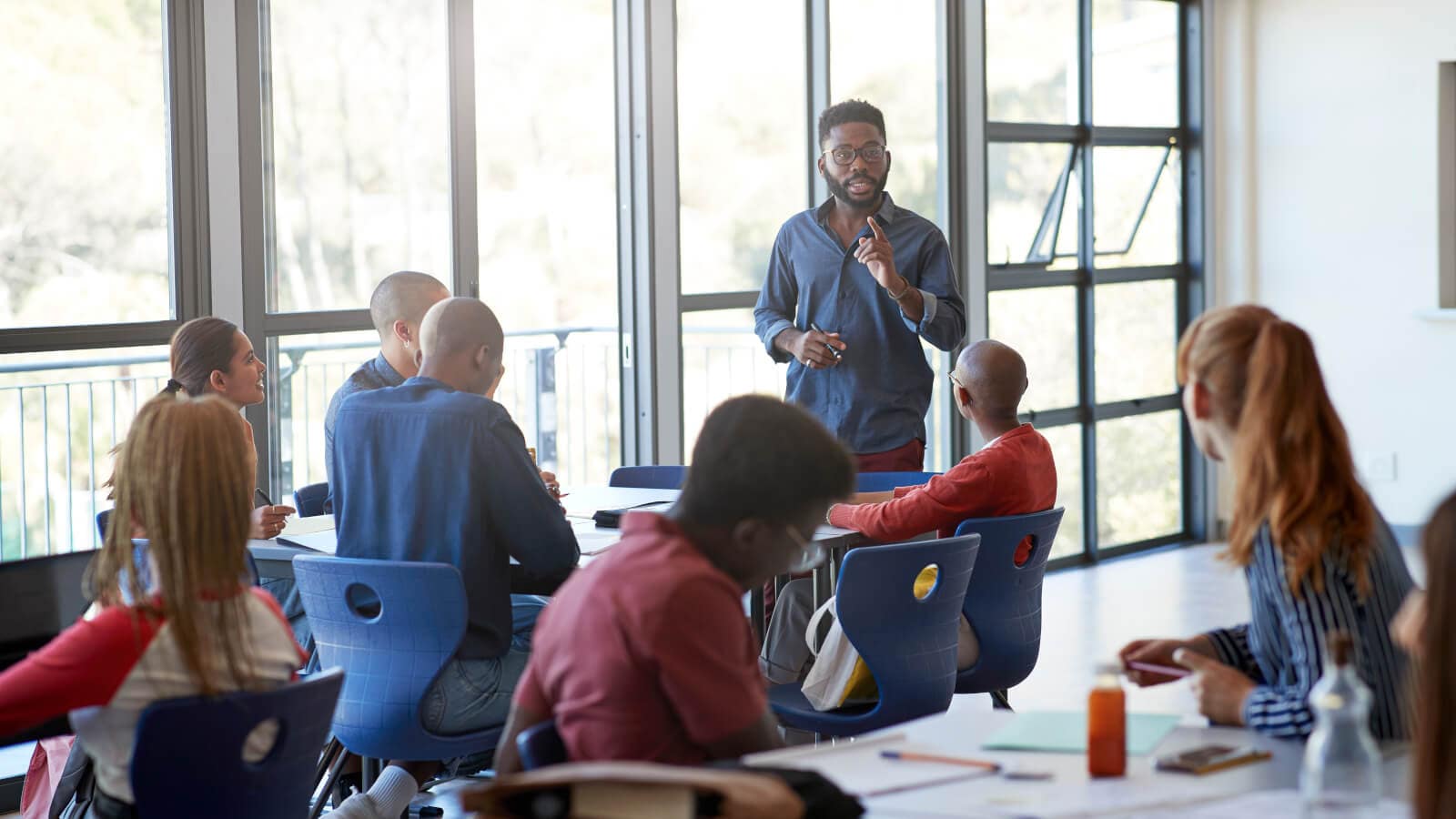
Living our societal purpose

Society demands that we stay true to our core values, serve the public interest, and contribute to the growth and development of our country and continent. At no time has this been more pertinent than during the pandemic.
An organisation’s societal purpose is a measure of its core business outputs, namely the products and services produced through the day-to-day operations from which it generates revenue. These outputs are intended to make a positive contribution to society and improve the quality of life for people.
We don’t operate in isolation from the society and communities in which we work, and we recognise that many face significant challenges. With our broad reach across the country, PwC South Africa is well-positioned to make a real economic impact in all the communities in which we operate.
In line with our purpose and strategy, we’re committed to fulfilling our responsibility by not only focusing on our corporate sustainability (formerly known as corporate responsibility) but also on what we do as a firm and how we help our clients to play a key role in the digital upskilling of the communities that we serve. Our purpose articulates this commitment, and our people demonstrate how we are reimagining Africa, together.

We have aligned our societal purpose strategy with the United Nations’ Sustainable Development Goals (SDGs). To make a meaningful impact in the societies in which we operate, we are focusing our efforts on the SDGs where we can contribute the most based on our expertise, skills, and resources. This doesn't mean that we don't support and contribute to the other SDGs, but we try to support projects and initiatives that make a broader contribution, ensuring that the impact thereof is always top of mind, so we can help to reimagine Africa, together.
The SDGs we have decided to focus on are:


Our corporate sustainability
Corporate sustainability initiatives can make a meaningful contribution to socio-economic development. We aim to honour our values — act with integrity, make a difference, care, work together and reimagine the possible — by being a responsible corporate citizen and creating sustainable value in the communities in which we do business.
We’ve invested over R3 million into social sustainability initiatives, but the biggest contribution we can make is in terms of our people's time. We have dedicated over 22,000 hours of our people's time towards social sustainability initiatives.
Our corporate sustainability programme aims to create measurable business and social value-enhancing outcomes. Our strategic priorities include:
- enhancing the socio-economic impact of our engagement initiatives.
- improving the transparency and relevance of corporate responsibility reporting.
- positioning PwC’s social brand, in line with our focus areas.
- social value-enhancing outcomes.
Quality education
Thuthuka education Upliftment Fund
The Thuthuka project is an initiative by the South African Institute of Chartered Accountants (SAICA). Its objective is to increase the number of qualified black and coloured chartered accountants in the country. The project implements various skills development programmes at primary, secondary and tertiary education levels, and places the bursary recipients at selected educational institutions. PwC has committed to supporting the Thuthuka bursary fund by taking part in the selection and sponsorship of Thuthuka students.
Standing with the Class of 2021
Standing with the Class of 2021 is a national matric maths and science revision programme. Sessions cover the entire matric maths and science curriculum and are aimed at preparing matric learners from under-resourced schools for their final examinations. The revision sessions are presented in an educational yet entertaining manner, encouraging learners to interact with teachers who are available to address queries from the pupils. Learners receive maths and science textbooks to further assist in the preparation for final matric exams.
The programme aims to increase the matric pass rate, as well as the number of bachelor’s passes, and to provide participating learners with access to some of the best maths and science educators, as well as detailed revision material to deepen their understanding of the subjects, free of charge. The programme touchpoints include cinemas, schools, digital and broadcast channels. Local youth social services organisation Primestars, has developed updated textbooks for the learners, which include exercises and past exam papers. PwC provided funding towards the cost of printing and distributing the booklets.
Winterberg School Trust
The Winterberg School Trust is a deep rural, non-profit and community-based organisation in the Eastern Cape providing access to quality education since 1990 whilst allowing children to live at home with their families. The Trust supports over 140 students from mostly isiXhosa farmworker families in isolated rural areas in the Winterberg.
The Trust provides:
- early childhood development, foundation phase and intermediate phase teaching;
- parental interventions and support;
- development and employment opportunities focused on women; and
- daily transport to schools in Tarkastad for high school learners.
Funds from PwC supported the Trust with its day-to-day operational expenses.

Decent work and economic growth
During the year under review, we continued to help small businesses grow by drawing on our expertise and that of our external partners. Apart from contributing to economic transformation, this approach has enabled us to develop a potential pipeline of new business for the firm.
Stakeholders with expert knowledge of the small, medium, and micro enterprises (SMME) landscape and technical knowledge of the fields in which our enterprise development (ED) beneficiaries are involved, continued to deliver impactful interventions. Our relationships with other stakeholders, including business incubators and tertiary institutions, enabled us to further our programme’s strategic objectives.
Our focus on impacting developing entities, which themselves have a focus on the development of other small businesses, has paid off. Previous and existing ED beneficiaries partnered with us to ‘pay it forward’ by incubating and accelerating the development of other beneficiaries in the programme.
Projects and organisations we supported:
- Faranani Rural Women’s Training Programme
Launched in 2006, this programme continues to drive PwC’s commitment to the upliftment and development of female entrepreneurs in rural communities and empowers them to generate income and become meaningful contributors to the South African economy. The continued success of the programme is evident in the well-attended sessions and positive feedback received. Find out more about the Faranani Rural Women’s Training Programme.
Enterprise and Supplier Development programme
We make significant investments in local small, micro and medium enterprises (SMMEs) in several industries through our Enterprise and Supplier Development (ESD) programme. We focus on enhancing revenue growth, creating employment, and developing our suppliers and SMMEs to a point of sustainability. Since the start of the COVID-19 pandemic, our programme involved more than 50 SMMEs, of which 14 converted from enterprise beneficiaries to suppliers to the firm. Through our programme we also contribute towards the Sustainable Development Goals (SDGs) of decent work and economic growth, reduced inequality, partnerships for the goals and gender equality.
Our ESD programme contributes significantly to our level 1 B-BBEE status and exemplifies how we build trust in society and deliver sustained outcomes through the SMMEs that we support. This year, we want to focus on supplier development and particularly our joint business relationship (JBR) partners so your support to identify and nominate promising JBR suppliers will help. Our network of business advisors grows businesses through reviews and analyses, workshops, opportunities, mentorship and general business compliance services.
For more information, please visit the ESD Google site.

Supporting non-profit organisations
Johannesburg Children’s Home
The Johannesburg Children’s Home (JCH) is the oldest of its kind in the city. The home needed to improve record-keeping and communication, as a way to generate detailed reports of its activities. These improvements would help the organisation simplify administration and apply for more funding from well-informed donors. Our main goal was to provide a 360-degree view of the home and its 64 children to its staff. With a streamlined and centralised way to manage their activities, staff would have more time to spend with children.
The concept came from a 2019 Hack-a-Thon, where various teams competed in building a solution to assist the organisation. The Smart Care team's concept was judged the winner. From June 2020 to February 2021, we designed, built, and implemented a solution using the Salesforce Non-profit Success Pack. It enabled the home to transition from a paper-based to a digitised model. This custom-built platform generates detailed insights into the children's lives and real-time reports for JCH's management, and also gives the home a centralised communication system.
We expect that our solution will fundamentally transform the home's manual operations. This new, digitised operating model simplifies data management, communications, and reporting capabilities. The home now has a database that helps staff manage donors, and it's easier for them to work as a team. In interviews, the staff described our implementation as revolutionary: anything that is going on with a child is now in one place. With a different approach to managing its operations, child centricity can remain at the core of the Johannesburg Children’s Home's focus.
This video tells the story of what PwC and the Johannesburg Children’s Home have been able to create together.
Supporting capacity of non-profit organisations
By providing skills and expertise on a pro bono basis, we support non-governmental organisations (NGOs) to better serve our communities, by helping them report their results effectively and accurately. We perform audits and provide advisory services to a range of non-profit organisations through formal fee-waived engagements. We also lend our support to these organisations through the time that our partners and staff commit to board positions.
Health and wellbeing
Solidarity fund
PwC in South Africa is contributing time and expertise in different forms to assist our government to deal with the effects of the COVID-19 pandemic, including as auditors to the Solidarity Fund on a pro-bono basis.
Gender Based Violence and Femicide Response Fund
PwC in South Africa continues to provide professional services other than external audit services on a pro-bono basis to the newly established private sector led Gender Based Violence and Femicide Response Fund (GBVF) launched by the South African President during February 2021.
Umbono
Umbono is a payroll-giving initiative that promotes the PwC purpose of building trust in society and solving important problems. This is done by living the PwC values of making a difference, showing care and working together to actively support charitable projects that benefit the communities in which we operate.
Umbono provides employees with an opportunity to initiate and support charitable projects through donations deducted directly from their salaries. The projects are entirely funded by staff donations and in certain instances supported with matched contributions by the firm. The total staff contribution received in the past 12 months was R220,000.
The pandemic continued to pose challenges to individuals, communities and society. Our Umbono initiatives embodied our values in support of our communities and societies through a number of initiatives.
Some of our Umbono initiatives:
- Kingdom Consultant Centre
- Helping with Kindness
- Arise and Shine Daycare Centre
- Woodrock Animal Rescue
Kingdom Consultant Centre
Kingdom Consultant Centre (KCC) is a non-profit Saturday school community development organisation aimed at uplifting children from the rural areas of Rabie Ridge, Ivory Park, and Tembisa in Gauteng, through mentorship and education,
KCC runs a two-hour Saturday school every weekend for children of all ages who are taught supplemental maths and english, and provided with lunch. The organisation initially started with 20 children and today hosts 80 registered learners.
We have also supported and created awareness around other charitable initiatives on an ad hoc basis, such as the Santa Shoebox Project and COVID-19 relief donations in the spirit of living our PwC values.
Helping with Kindness
Helping with Kindness is an organisation formed in response to the serious plight of those less fortunate. It provides food, clothing, blankets, and other practical assistance to people in need around Johannesburg. What started as a once-off gesture of three friends making six sandwiches has grown into a weekly initiative making a significant impact in these communities. Umbono provides monthly donations towards grocery costs, which are used to prepare +/- 300 meals that are distributed every weekend.
Arise and Shine Daycare Centre
Arise and Shine is a children’s daycare centre for under-privileged children in Soweto. The centre runs an after-school programme to help older children with homework and offers extracurricular activities such as singing and gumboot dancing.
We support the centre, which provides education to 60 children by assisting with teachers’ stipends. In addition, we pay for food and gas, and other ad hoc activities such as the annual December Christmas party and a stationery drive in May.
Woodrock Animal Rescue
Woodrock Animal Rescue is a non-profit, pro-life, rescue, rehabilitation, and re-homing organisation founded in 1992. Neglected, abused, ill or unwanted animals are cared for until they find a forever home. The organisation has a dedicated and passionate team working day and night to help rehome and take in as many animals as they can.
Umbono supports this initiative through quarterly donations based on essential needs. We have donated food, treats, toys, blankets, cleaning supplies, and much more.
Some other ad hoc activities that we have supported include our volunteers spending a day at Woodrock with the animals and walking the dogs. We have also sponsored a kennel.

Our client responsibility
Incorporating good corporate practices into all of our services is ingrained in how we do business. We hold true to our purpose of building trust in society and solving important problems. Our solutions build trust and deliver sustainable outcomes because we incorporate sound corporate practices. We hold our clients accountable for thinking about how they are affecting the community around them.
We participate in projects that drive building trust in society, including those that ensure gender diversity in specific industries, COVID-19 vaccine rollouts, and projects that challenge the composition of executive remuneration. If there are tough conversations to be had, we know it is our responsibility to step in and share our views.
Our firm responsibility
Even though our corporate sustainability contribution and the work we deliver to our clients are very important, what we do as a firm is just as critical. We hold ourselves accountable to be a good example for others.
Throughout this report, you will see evidence of our accountability regarding caring for our people. In addition, you will also see evidence of our continued commitment to support transformation from a gender and race perspective. By doing so, our firm will become more reflective of our society. All of our initiatives are grounded in supporting the Sustainable Development Goals and creating a better tomorrow.
Estimated economic impact
In today’s fast-changing world, business faces challenges that extend beyond the bottom line. Professional services firms, like PwC, are required to demonstrate their economic contribution. They also need to communicate with a broad range of stakeholders, maximise the social impacts of investments and accurately report on their broader economic and social impacts. In such challenging economic times, where society demands more, it’s critical to quantify the impact of these decisions.
PwC’s economic contribution to South Africa is estimated through its impact on national gross domestic product (GDP), jobs, public finance, and household income. Capital expenditure associated with our new building in Waterfall City, Johannesburg, and through the impact of our day-to-day operations has also been included.
Contributing meaningful economic and fiscal value through our operations
The expenses incurred through our day-to-day operations and the people directly employed have a quantifiable beneficial impact on the South African economy. Our operations will continue to have a positive impact on the South African economy by delivering long-term economic benefits.
Contribution to public finances
PwC’s contribution to public finances forms a major part of our positive impact on the societies in which we operate. Our contribution to public finances is both direct and indirect, through a wide range of taxes, as well as non-taxation revenue mechanisms. We also contribute indirectly to government tax revenue and stimulate economic activity throughout our operations, incorporating a wide range of producers and suppliers.
Our societal contribution
In looking to address major societal needs through long-term value creation strategies, PwC South Africa recognises its role in supporting the government to deliver on the SDGs. This can lead to an improved response to the economic, social, and environmental challenges that the world faces and unlock new opportunities for growth and long-term value for our stakeholders.
The total economic contribution of PwC is intrinsically linked to development, as it provides some of the revenue needed by the government to mobilise resources.
PwC’s purpose means we want to work with others to help solve important problems facing the world today. We want to do so in a manner that builds trust in society. Through our socio-economic contribution, we contribute to driving growth in the South African economy and, in turn, ongoing improvements in many people’s lives.
Environmental impact
As a professional services firm, our direct environmental impact is small when compared to many other industries, but we're committed to minimising it as part of being a responsible business.
Our net zero commitment
Climate change is one of the most pressing problems facing our world today. In September 2020 PwC announced a worldwide commitment to reach net-zero greenhouse gas (GHG) emissions by 2030. Our net-zero commitment is underpinned by a science-based target (SBT) in line with a 1.5-degree scenario to prevent the worst impacts of climate change, as set out in the Paris Agreement.
In July 2021, our emission reduction targets were independently validated by the Science Based Targets initiative (SBTi).

We have established an Africa net zero governance structure with dedicated workstreams and a Project Management Office. This team helps to drive PwC Africa’s commitments. They work towards understanding and analysing our emissions from PwC offices, business travel and, suppliers and develop associated emissions reduction programmes that are monitored and reported on.
PwC South Africa has three flagship buildings — our offices in Cape Town, Durban, and Johannesburg — that incorporate various green technologies and practices to reduce the firm’s carbon footprint and provide a healthier and more productive work environment. These three buildings cover a total of 53,000m² (Cape Town: 9,000m²; Durban: 4,000m²; and Johannesburg: 40,000 m²).

As a service-based business, greenhouse gases (GHGs) (8 919 tonnes CO2e) account for most of our environmental impact. This comes from the energy we use in our buildings and from travelling to our clients.

Waste is measured as sent to landfill and to compost. Waste is significantly down from 2019 due to our efforts around waste reduction, but also due to limited office use during the pandemic.

Our business doesn’t require large amounts of water; we focus our efforts on reducing consumption. Water consumption has been measured in the three main buildings. The water consumption is significantly down from 2019 due to limited office use during the pandemic.
Contact us

Verena Koobair
Head of Communications and Societal Purpose Firm Pillar Lead, PwC South Africa
Tel: +27 (0) 11 797 4873























